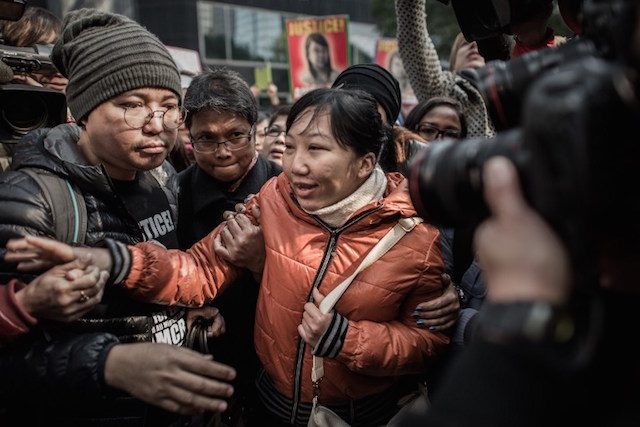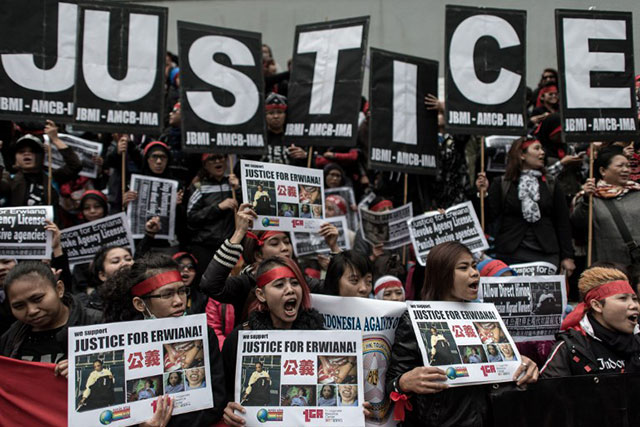SUMMARY
This is AI generated summarization, which may have errors. For context, always refer to the full article.

HONG KONG, China (3rd UPDATE) – A Hong Kong woman was convicted Tuesday, February 10, of beating and starving her Indonesian maid in a “torture” case that sparked international outrage and spotlighted the plight of migrant domestic workers in the Middle East and Asia.
“You are remanded in custody,” Judge Amanda Woodcock told Law Wan-tung, after announcing to a packed courthouse that the 44-year-old had been found guilty of 18 of the 20 charges laid against her.
The 44-year-old mother-of-two was arrested in January last year for seriously wounding her former domestic helper Erwiana Sulistyaningsih, who left the city also in January. (READ: Indonesian maid hospitalized after Hong Kong torture)
Pictures of the injuries sustained by the 23-year-old, who was admitted to hospital in Indonesia, emaciated and in a critical condition, shocked Hong Kong and sparked anger in her home country.
Law has denied all the charges against her, including causing grievous bodily harm with intent, criminal intimidation and failure to pay wages – a total of 20 counts, some of which also relate to her previous employees. The most serious carry a maximum sentence of life in prison.
“I am sure she was telling the truth,” Woodcock said, referring to Sulistyaningsih, who told the court she had been “tortured” by Law.
“She was, for want of a better word, a prisoner on those premises,” the judge added.
“She did not complain about the abuse because of fear… When Erwiana left Hong Kong, she was a shadow of her former self.”
A jubilant Sulistyaningsih, clad in a black t-shirt with her face emblazoned on it and the word “justice”, told AFP after the verdict was read out that she was “very happy”, and hugged nearby activists.
Law, meanwhile, lowered her head but appeared to be calm.
The only two counts she was not found guilty of were related to her treatment of another domestic worker.
‘Victory for Erwiana’
“It’s a victory for Erwiana,” an ecstatic Aaron Ceradoy, programme coordinator for the Asia Pacific Mission for Migrants, told AFP outside the courthouse.
“It would be good if the migrant community can use this case to strengthen their position on their demands for changes in policies.”
During the 6-week trial, prosecutors have said Law turned household items such as a mop, a ruler and a clothes hanger into “weapons” against her maids.
Sulistyaningsih has described in vivid detail how she was “tortured”, starved, beaten and ritually humiliated by Law with prosecutors saying she was treated as an “unpaid slave”. (READ: Indonesian maid tells court of ‘torture’ by HK employers)

The case sparked protests by migrant workers in the financial hub and has shone a spotlight on the plight of migrant domestic helpers in Asia and the Middle East after reports of torture and even killings. (READ: Thousands of HK domestic helpers rally for ‘tortured’ maid)
Sulistyaningsih said she lived for months on nothing but bread and rice, sleeping only four hours a day and being so badly beaten by her then-employer that she was knocked unconscious.
Law’s defense accused the former maid and another two domestic helpers involved in the case of being “opportunistic”, adding their evidence showed the injuries could have been caused by accidents.
Hong Kong is home to nearly 300,000 maids from mainly Southeast Asian countries – predominantly Indonesia and the Philippines – and criticism from rights groups over their treatment is growing.
Amnesty International in 2013 condemned the “slavery-like” conditions faced by thousands of Indonesian women who work as domestic staff and accused authorities of “inexcusable” inaction.
It found that Indonesians were exploited by recruitment and placement agencies who seize their documents and charge them excessive fees, with false promises of high salaries and good working conditions. – Rappler.com
Add a comment
How does this make you feel?
There are no comments yet. Add your comment to start the conversation.